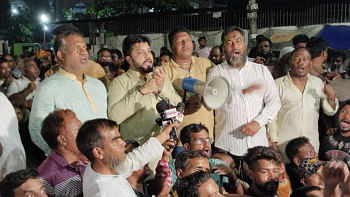Not returning anytime soon
Many of Tarique Rahman's supporters in BNP lobbied for him to run in a parliamentary by-election in April 2009, but his mother Khaleda Zia felt it was too early for him to return home.
During a talk in London with a US embassy official from Dhaka on May 1 that year, Tarique himself also said he had no plan to come back anytime soon, Geeta Pasi, the then chargé d' affaires of the US embassy in Dhaka, wrote in a cable on May 14, 2009.
Tarique even said he was interested in the political developments in the country, but denied playing any active role in BNP politics.
“Still, he said nothing to dispel the widespread expectation he would eventually return to Bangladesh and take over the helm of the BNP,” reads the diplomatic cable published by WikiLeaks on August 30 this year.
Seven months into that talk, Tarique was made BNP's senior vice chairman.
“The BNP continues to function primarily as Khaleda Zia's personal fiefdom, making her eldest son [Tarique] her natural successor,” Geeta Pasi commented in the cable.
BNP stalwarts also are keenly aware of Tarique's proven organisational skills, which will be indispensable the next time the party faces off with Sheikh Hasina's Awami League, it says, adding: “Despite his current exile, there can be little doubt that Rahman [Tarique] could perhaps one day lead Bangladesh.”
LIFE IN 'EXILE'
A political specialist of the US embassy in Dhaka met Tarique at the suburban London residence of the BNP's British chapter president after Tarique was “forced to leave Bangladesh” on September 11, 2008, according to the cable.
Jailed on graft charges, the government released Tarique on bail to travel abroad for medical treatment for a back injury he claimed to have sustained during torture in custody, it added.
Saying that he was widely considered one of the most corrupt individuals in Bangladesh, Geeta Pasi said Tarique, who used a crutch to walk, said he still took painkillers and was unlikely to ever return to normal health.
“I fall far behind when I walk with my wife and daughter. They stop and let me catch up. Just the reverse of what I used to do for them when I was in normal health,” the officer quoted Tarique as saying.
“Still, Rahman looked much healthier than when he left Dhaka eight months earlier and he said he took physiotherapy three times a week in London,” the cable said, adding that Tarique was keeping a low profile in London and the few local Bangladeshi expatriates the embassy political specialist met during his short stay had said they did not know his whereabouts.
In the four-hour conversation, “Tarique recounted his interrogation by army officers in December 2007 and the torture he said resulted in a damaged spine.”
Tarique discussed his vision for achieving a prosperous Bangladesh “but spoke bitterly of what he described as the media campaigns against him”, said the cable.
He said he had no plan to return to Bangladesh for the time being and gave no hint as to when he might return.
When asked what role he might want to play in the BNP, he replied: “No one is indispensable. Someone or some others will come up to work if there is a void.”
He once referred to himself during the conversation as “an ex-politician”. Tarique did not say much about his mother, except to regret the fact her sons and grandchildren all were abroad.
ALLEGED TORTURERS
Returning to his arrest on what he said were “flimsy grounds” and the physical abuse resulting in his disability, Tarique identified Brig Gen (now retired) Fazlul Bari Chowdhury as one of his torturers and offered to testify against him.
The cable had a note that said Tarique's family previously alleged that Lt Gen Masud Uddin Chowdhury had inspected the scene to make sure officers were actually beating him.
Ironically, Bari and Masud were considered ardent BNP supporters, Geeta Pasi wrote.

 For all latest news, follow The Daily Star's Google News channel.
For all latest news, follow The Daily Star's Google News channel. 



Comments